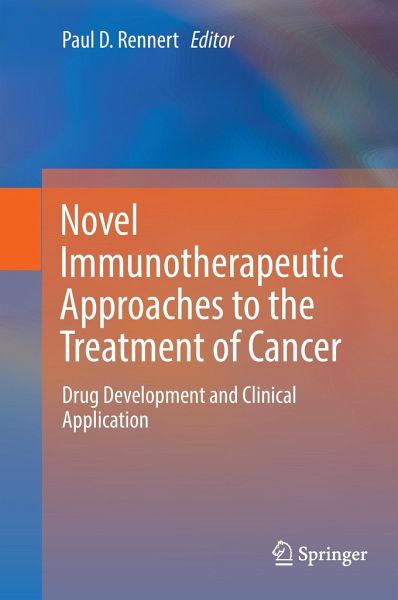
Novel Immunotherapeutic Approaches to the Treatment of Cancer
Drug Development and Clinical Application
Herausgegeben: Rennert, Paul D.

PAYBACK Punkte
57 °P sammeln!
Cancer care is undergoing a radical transformation as novel technologies are directed toward new treatments and personalized medicine. The most dramatic advances in the treatment of cancer have come from therapeutics that augment the immune response to tumors. The immune checkpoint inhibitors are the best-known and most highly advanced examples of Immune Therapeutics targeting tumor cells and include approved antibody drugs directed at the cell surface proteins CTLA4 and PD-1. These are now considered foundational treatments for several solid tumor indications, and that list of indications is ...
Cancer care is undergoing a radical transformation as novel technologies are directed toward new treatments and personalized medicine. The most dramatic advances in the treatment of cancer have come from therapeutics that augment the immune response to tumors. The immune checkpoint inhibitors are the best-known and most highly advanced examples of Immune Therapeutics targeting tumor cells and include approved antibody drugs directed at the cell surface proteins CTLA4 and PD-1. These are now considered foundational treatments for several solid tumor indications, and that list of indications is growing quickly. More broadly, antibodies have become workhorse molecules across the entire immunotherapy landscape. Antibodies to novel targets modulate the activity of diverse immune cell regulatory proteins. Engineered antibodies can induce tumor cell death or expose tumor cells to poisonous toxins (ADCC and ADC, respectively). Bi-specific antibodies can engage multiple tumor targets simultaneously, or can redirect lymphocytes to attack tumor cells. The antigen-binding domains within antibodies can be spliced onto cell stimulatory domains and transduced into T cells or NK cells, creating remarkable tumor-specific cellular therapeutics (CAR-T, CAR-NK). Beyond antibody-based therapies there are highly diverse and differentiated technology tool kits being applied to immunotherapy. Small molecule drugs are being developed to attack the tumor microenvironment, novel tumor vaccine approaches are showing great promise, patient lymphocytes are being isolated, expanded and reintroduced to patients, gene-editing techniques are becoming widely deployed, and a vast number of new tumor targets, and mutated tumor proteins (neoantigens), are being discovered.
The past decade has seen unprecedented success in the treatment of diverse cancers. The authors of this volume have been asked to not only review progress to date, but importantly, to look ahead, and anticipate the evolution of cancer treatment across diverse Immune Therapeutic approaches. Our hypothesis is that the advances we are seeing across the immunotherapy landscape will further evolve and synergize, leading us finally to outright cures for many cancers.
The past decade has seen unprecedented success in the treatment of diverse cancers. The authors of this volume have been asked to not only review progress to date, but importantly, to look ahead, and anticipate the evolution of cancer treatment across diverse Immune Therapeutic approaches. Our hypothesis is that the advances we are seeing across the immunotherapy landscape will further evolve and synergize, leading us finally to outright cures for many cancers.














